
How the Congolese Presidential family used tainted money to buy a Trump apartment in New York City.
The daughter of the kleptocratic ruler of Republic of Congo used millions of dollars of apparently stolen state funds to buy a luxury apartment at the Trump International Hotel & Tower in New York City, Global Witness’ new investigation reveals. Despite the risks associated with the transaction, the Trump Organization brokered and profited from the apartment deal.
Download the policy briefing (PDF, 124KB)
Meet the Republic of Congo’s Sassou-Nguesso family – rulers of one of the longest-lasting authoritarian regimes on the planet. In power for much of the past four decades, the Sassou-Nguesso family own properties worth millions around the world and have been accused of using their positions of power to enrich themselves – an accusation some have also directed at the current first family of the United States of America.
But that’s not all that links the Trumps to the Sassou-Nguessos. Global Witness’ new investigation reveals that the daughter of Congo’s President appears to have helped herself to almost 20 million dollars in public funds and laundered part of the cash through U.S. property – specifically, a luxurious Trump apartment in Manhattan worth more than 7 million dollars. This is yet further evidence that some of the world’s most notorious politicians and businesspeople choose to stash their cash in Trump property.
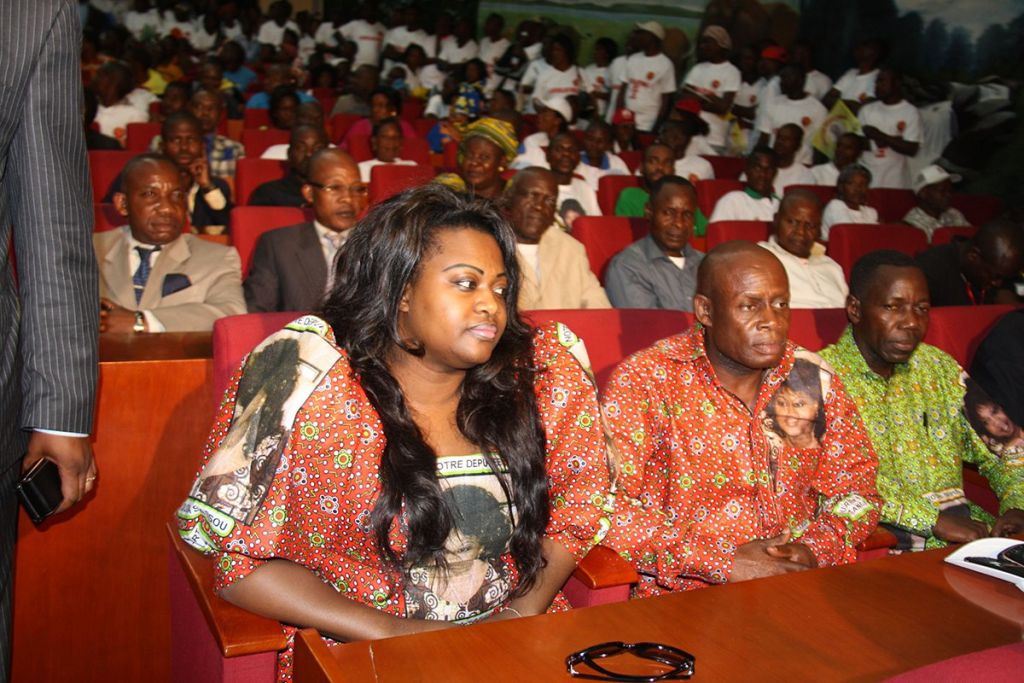
At the heart of the apparent money-laundering scheme is Claudia Sassou-Nguesso (left) — daughter of the Congolese President and presidential head of communications. © GUY GERVAIS KITINA/AFP/Getty Images
The U.S. President boasts that he has made a fortune from his name, with a willing client base in many corners of the globe. Huge letters spell out “Trump” on buildings across the world, though what was once considered by some to be a marker of brash luxury is today a lightning rod for protests and investigations.
Yet, Trump-affiliated properties, hotels and condos have been a source of revenue for the Trump Organization and ultimately Trump himself, whether from sales, licensing, rental or management fees. Questions swirl around the source of the vast sums of money invested in Trump properties, with the New Yorker recently describing several of Trump’s property deals as showing signs of “possible money-laundering, tax evasion, sanctions violations, and other financial crimes.”
One of the most prominent Trump buildings is the towering apartment and hotel block looming over Manhattan’s Central Park: the Trump International Hotel & Tower at 1 Central Park West (Trump International). Trump himself has described it as his “flagship” hotel. Since the late 1990s, people have bought over 150 private apartments in the building, and Trump’s company has sold 176 units that are rented as hotel rooms. Once sold, these apartments and units continue to pay fees to companies Trump led until he became U.S. President.
What follows is the story of apartment 32G in Trump International, and how Claudia Sassou-Nguesso, daughter of Congo’s President, used apparently stolen public funds to purchase it in the summer of 2014. The tale involves a notorious Portuguese middleman, a world-renowned American law firm, a complex network of secretive companies in multiple jurisdictions, and a now-defunct bank, and raises serious questions about the role Trump Organization played in a suspected money laundering scheme.
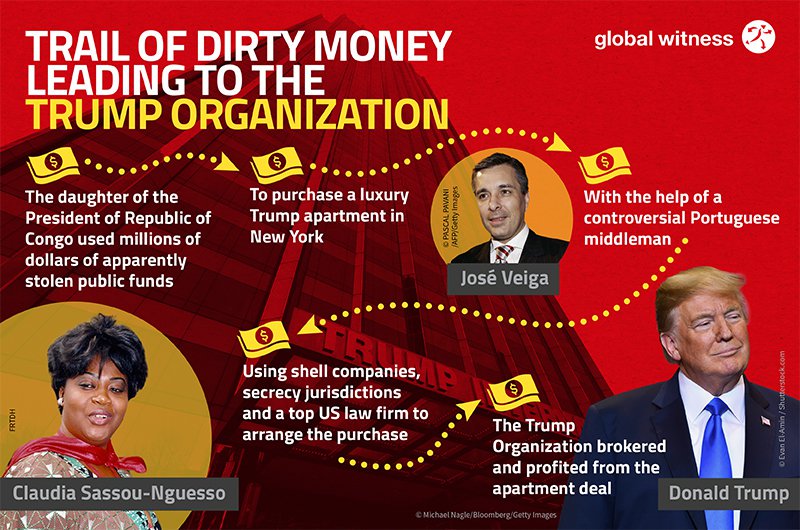
A LUXURY PAD IN THE HEART OF MANHATTAN
In 2017, Portuguese journalist Micael Pereirastarted to ask questions about the owner of an apartment in the Trump International. The reporter had information indicating that unit 32G had been purchased in July 2014 by José Veiga, a businessman and former director of the major Portuguese soccer club Benfica. By the mid-2010s, however, Veiga was also becoming known as a personal business fixer for the Congolese President.
Congo has quietly risen to become sub-Saharan Africa’s fourth biggest oil producer, earning huge revenues from its offshore black gold. However, the country is beset by corruption and mismanagement, and despite its oil wealth it consistently performs badly in development indices.
Denis Sassou-Nguesso, the fourth longest serving authoritarian leader in the world, rules Congo. Corruption, usually around oil deals but also in infrastructure projects and other procurement contracts, has fuelled lavish spending sprees by President Sassou-Nguesso’s family. Since 2010, following a criminal complaint filed by French non-governmental organizations (NGOs), French prosecutors have pursued the family’s assets on the basis that they had been acquired through misappropriation of public funds and money laundering. The case is known as the Affaire des Biens Mal Acquis (Ill-Gotten Gains) and is ongoing.
As part of the probe, French investigators found that President Sassou-Nguesso and his family had spent $67.6 million (€60 million) on luxury goods and real estate assets in France. Stories of extravagance abound: the President reportedly spent over a million dollars on shirts and suits from luxury Parisian boutiques, while France’s Libération newspaper quoted a former aide to the presidential staff saying that the President’s son “changes shirts three or four times a day and boasts that he never washes them and uses them as Kleenexes”.
In a 2017 report, the Swiss NGO Public Eye showed how, from 2011, Veiga had acted as a representative for the Brazilian company Asperbras in Congo. In this role, Veiga leveraged his close relationship with the Sassou-Nguessos to close hyper-inflated contracts with the Congolese government, according to Public Eye. All told, Asperbras got deals in Congo worth some $1.5 billion. Veiga’s arrangement with Asperbras reportedly gave him a three percent cut of the total value of the deals.
Given the Congolese government’s reputation for corruption, Portuguese authorities had questions about Veiga’s affairs in the country and arrested him in early 2016, citing his alleged involvement in money laundering and international corruption in Congo. He was released five months later and the investigation is ongoing. No charges have been brought so far.
In this context, it is no surprise that the Portuguese media became interested when Veiga’s name was linked with the apartment in the Trump International. Pereira, the journalist looking at the story in 2017, contacted Veiga for comment. Veiga was happy to claim the apartment was his.
The apartment in question is owned by a company, of which I am the shareholder. The acquisition made by this company was financed by my own means, in a business that has nothing to do with third parties, namely the family of the President of Congo- José Veiga, responding to Portuguese journalist Micael Pereira in 2017
This is a lie.
Global Witness’ new investigation reveals that a company belonging to Claudia Sassou-Nguesso, a Congolese member of parliament, the presidential head of communications and the daughter of Congo’s President Denis Sassou-Nguesso, provided the funds for the purchase of the apartment using millions of dollars of Congolese public money. Public officials’ salaries in Congo are highly unlikely to fund the purchase of this kind of luxury property. There are strong grounds to suspect the funds were stolen from the Congolese treasury. Veiga was merely the frontman for Claudia Sassou-Nguesso in the deal.
A MONEY-LAUNDERING SCHEME?
In 2007, President Lula, former Brazilian leader, attended a seminar in Congo aimed at promoting investment opportunities in both countries, alongside Brazilian business representatives. At the meeting, the two presidents did a deal: Congo’s debt would be cancelled in exchange for infrastructure contracts for Brazilian companies.
Officials from Asperbras, a company founded in the small Brazilian countryside town of Penápolis, saw this as a prime opportunity to begin operations in Congo. Until then, the company’s speciality had been the manufacture of PVC pipes and connectors for agricultural irrigation in Brazil. The Brazil-Congo deal would allow Asperbras to expand its horizons and areas of expertise, but it needed a local agent to help it do business with the Congolese government. Asperbras turned to Veiga.
Asperbras told Global Witness that Veiga “was the best available option” because he was fluent in French, had contacts in the country and knowledge to develop Asperbras’ activities in Congo. The company said that its relationship with Veiga was for brokerage services and that he acted as a business intermediary in Congo. He “was never a shareholder, director or representative of Asperbras”.
Thanks to Veiga, in just a few years, Asperbras won a diverse range of contracts with the Congolese state: geological mapping, construction of an industrial park, digging 4,000 hydraulic boreholes and building 12 hospitals. The company claimed the latter to be “the largest public health project in the African continent”.
The work of Asperbras is changing the lives of millions of Congolese citizens for the better- Asperbras promotional video
However, the prices Asperbras was charging in Congo were inflated, according to the French newspaper Le Canard Enchaîné. The newspaper found the geological survey contract signed between Asperbras and the French state-owned entity Bureau de Recherches Géologiques et Minières (BRGM) cost up to ten times more than similar work BRGM had previously done. The company’s borehole contract was up to seven times more expensive than comparable contracts, as alleged by the newspaper.
These sorts of apparently hyper-inflated deals with the state should set alarm bells ringing as they can signal corruption: public procurement is rife with corruption around the world as fixed contracting can lead to excess public funds being shared between corrupt officials and contractors involved in reaching any deal.
In response to written questions from Global Witness, Asperbras said it could not comment on what BRGM charged for its services as the two companies were independent. Asperbras argued that it was misleading to compare projects between countries since in Congo the work was on a larger scale, having been carried out throughout the country. Asperbras completely refuted any claim of over-priced contracts and irregularities in the Congolese public procurement process.
Money to pay for at least one of Asperbras’ contracts flowed out of Congo’s treasury and into an Asperbras subsidiary. A portion of those funds would eventually find their way to Claudia Sassou-Nguesso’s company and was used, ultimately, to purchase the apartment in the Trump International.
Bank statements and business contracts reviewed by Global Witness show in detail the circuitous route taken by the funds from Congo to Delaware, the British Virgin Islands and Cyprus. The real estate acquisition was eventually made using a New York-based shell company, set up just before the purchase.
First came the payment from the Congolese treasury to Asperbras. Bank records for Asperbras LLC (the Asperbras subsidiary in Delaware) show that on November 28, 2013 it received $675 million (€491.1 million) from Dgt Services Virement Congo Brazzaville. The sender was a department within the Congolese Ministry of Finance and Budget responsible for managing the treasury.
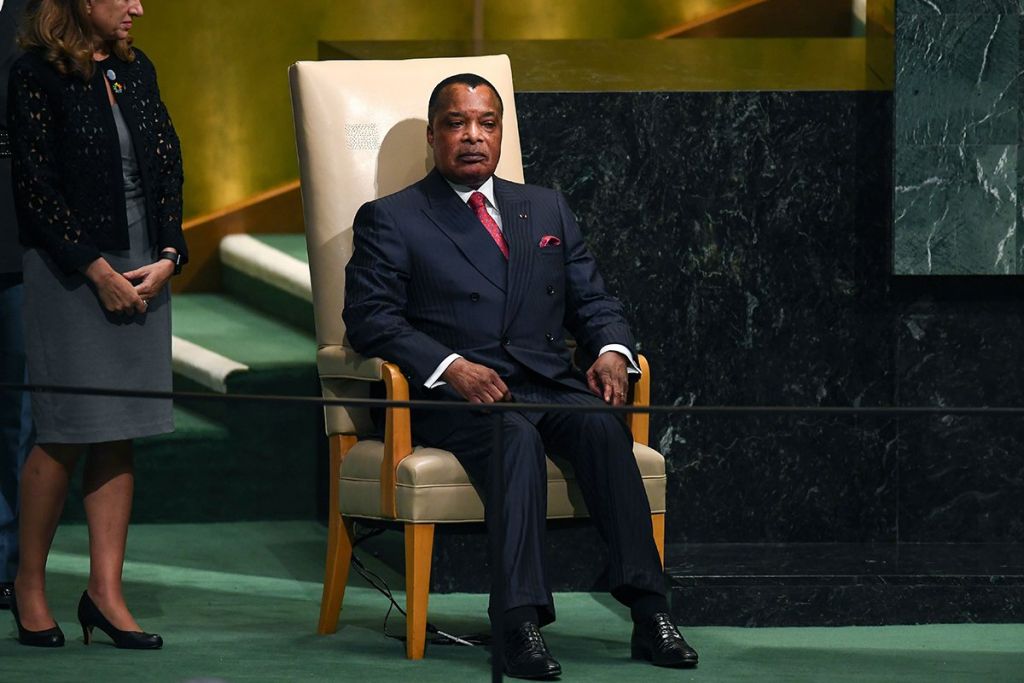
President of Republic of Congo, Denis Sassou-Nguesso, father of Claudia, is one of the longest-serving authoritarian rulers in the world. © JEWEL SAMAD/AFP/Getty Images
The Congolese treasury paid the money into Asperbras LLC’s account at Banco Espirito Santo, a bank that is now defunct following a period of “ruinous mismanagement” that corresponds with the dates of these transactions. Global Witness does not suggest that the bank was party to any alleged money laundering scheme. Bank documents show that Asperbras LLC had only a couple of thousand dollars in that account until the massive payment from Congo arrived.
Asperbras LLC now needed a pretext to move some of those funds on to other companies. On December 11, 2013, less than two weeks after the payment of more than half a billion dollars was received by Asperbras LLC from the Congolese treasury, a second Asperbras subsidiary, the British Virgin Island-based Energy & Mining Asp. Inc., subcontracted a Cypriot company called Sebrit Limited to carry out part of the geological mapping project. Sebrit had been incorporated only two days before the contract was signed.
Energy & Mining, the second Asperbras subsidiary, agreed to pay $19.5 million to Sebrit: $6.8 million upon completion of a “Geophysical Report” and $12.7 million for Sebrit to “search for new business to the client [Energy & Mining]”, according to the contract reviewed by Global Witness.
On December 13, 2013, two days after the contract was signed, Asperbras LLC transferred $31 million (€22.7 million) to Energy & Mining and then, three weeks later on January 6, 2014, Energy & Mining paid $19.5million (€14.3 million) to Sebrit. This was the first and only amount credited to Sebrit’s bank account according to a Portuguese police report reviewed by Global Witness.
Sebrit was an opaque Cypriot company that did not appear to have the capital or expertise to carry out the public works it was contracted to do. It had been operating for only two days before it signed the deal with Energy & Mining, had no website, no presence on LinkedIn or similar sites, with not a single identifiable employee; it does not appear to have been a company carrying out any genuine business, let alone one that would have any expertise in geological mapping. In fact, French company BRGM, mentioned above, seems to have carried out the geological mapping project. Given its apparent lack of real business, Sebrit was in all likelihood simply a vehicle for extracting and laundering Congolese public funds, and was later dissolved in July 2018.
Asperbras explained that BRGM carried out only part of the geological mapping project. It did not mention the nature of its transactions with Veiga’s companies, including Sebrit. Asperbras said it could not respond to questions into its Congo deals as they are under investigation in Portugal.
SEBRIT’S SECRETS
During this period, Sebrit was part of a structure of three different Cyprus-registered companies. Sebrit’s shares were owned by one of these companies, called Voxxi, which was in turn fully owned by the third Cypriot company, Leezu.
Veiga was named as the sole director for each of the companies, and listed as the only shareholder of Leezu, the company at the top of the structure. At first glance, then, Veiga appears to have been the owner of this set of companies – at least according to publicly available corporate documents.
This is perhaps the biggest corruption red flag so far with regards to Sebrit’s geological mapping contract: Veiga was on both sides of this deal with the Congolese government. First, he was representing the contracting company, Asperbras, in Congo; second; he was also the apparent director and owner of the subcontractor, Sebrit. This is a glaring conflict of interest and a common trait in corrupt contracting arrangements.
Veiga was not the only person behind these Cypriot companies, however. Global Witness has uncovered notarized contracts from the Congolese capital Brazzaville revealing that while Veiga was the listed director of the companies, he was actually just a front.
An obscure contracting arrangement hid the identity of the true owner and beneficiary of the network: Claudia Sassou-Nguesso, daughter of Congo’s President.
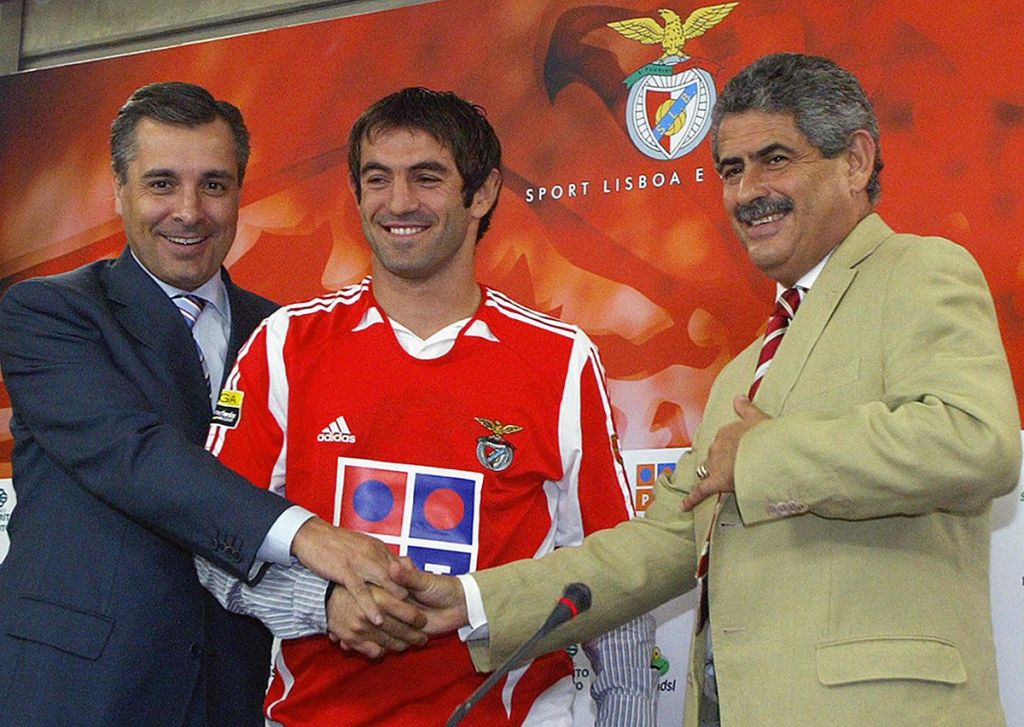
Before he became involved in Congo, José Veiga (left) was a director of Portuguese football club Benfica. Here he is pictured at a press conference for the club in 2005. © FRANCISCO LEONG/AFP/Getty Images
Key to this arrangement are two types of contract: a Cession d’actions (Share Transfer Agreement) and a Convention de portage d’actions (Carrying Agreement). Global Witness has reviewed two sets of these contracts, for both Leezu and Voxxi. The documents indicate that they were drawn up in Brazzaville and notarized by the ‘Office Notarial Galiba’, a Congolese notary.
The share transfer agreements provide for 100 percent of the shares in both Voxxi and Leezu to be transferred from Veiga to Claudia Sassou-Nguesso. These contracts are both dated July 16, 2013. As a result, Claudia Sassou-Nguesso became the owner of the shares and assets of the companies and their subsidiaries, including Sebrit.
The carrying agreements, registered by the same Congolese notary on the same date, show Claudia Sassou-Nguesso granting Veiga authorization to manage both Voxxi and Leezu on her behalf. Veiga is required to remit all gains to her. The contracts specify that Veiga would not receive any remuneration for managing the companies – this seems an unusually generous concession and is another indicator of a potentially corrupt arrangement.
These contracts meant that, from July 2013, Claudia Sassou-Nguesso was the hidden owner of Sebrit, which by January 2014 had received almost $20 million of Congolese public funds via an apparent sham contract for public works.
Asperbras said it did not know of any financial transaction carried out by Veiga on behalf of any “Politically Exposed Person” (PEP) in Congo. Claudia Sassou-Nguesso would qualify as a PEP.
Global Witness sent written questions to Claudia Sassou-Nguesso, José Veiga’s lawyer, an email address for the public works ministry in Brazzaville, and the Congolese government spokesperson, asking for comment on the details and allegations laid out in this article. No substantive responses to the allegations put to them for comment were received from any of these parties within the deadline provided.
LIVING THE HIGH LIFE
Documents and sources consulted by Global Witness indicate that – after receiving its payment from Asperbras subsidiary Energy & Mining – Sebrit, with Claudia Sassou-Nguesso’s ownership obscured, made a cash payment for apartment 32G in the Trump International.
The ostentatious apartment cost $7.1 million. It has an open view of Central Park from an imposing skyscraper equipped with “concierge and valet services, gym, spa and pool”. Residents can also order food from a Michelin-star restaurant located in the hotel.
American law firm K&L Gates LLP, ranked in the top 20 law firms worldwide, was hired to enable the property acquisition. To arrange the purchase, K&L Gates incorporated a company called Ecree LLC, registered in New York on May 30, 2014 – only two months prior to the apartment’s purchase. Neither Veiga’s nor Claudia Sassou-Nguesso’s names are on corporate documents for Ecree obtained by Global Witness. Instead, the director of Ecree is a lawyer at K&L Gates and the registered address for Ecree is that of the K&L Gates office in New Jersey.
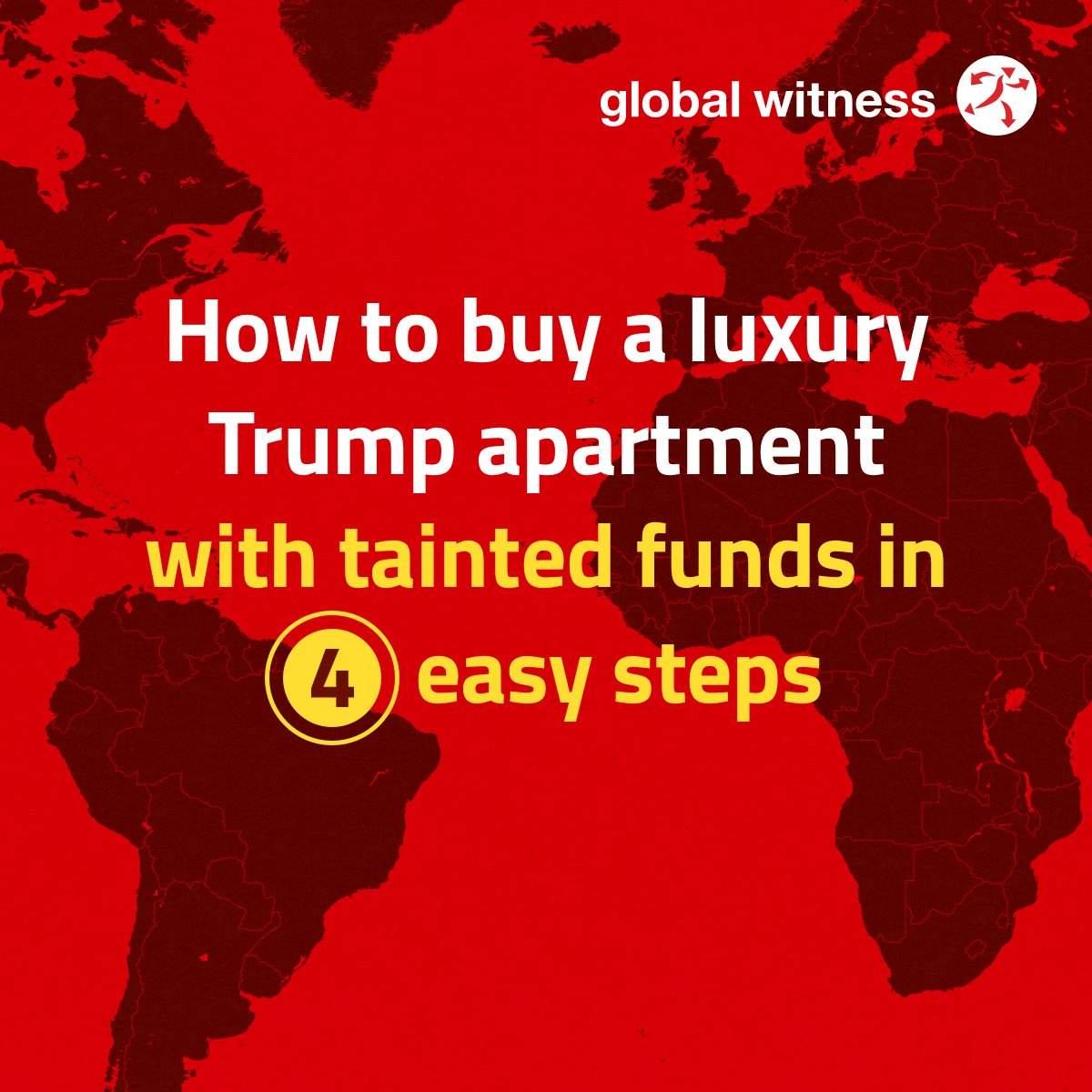

Global Witness✔@Global_Witness
#Trump companies accepted apparently stolen Congolese state funds from the #CongoBrazzaville Presidential family to purchase a luxury apartment in Trump Hotel & Tower in Manhattan.
The Trump Organization brokered and profited from the apartment deal: https://bit.ly/2D4HCk4 716:01 PM — Apr 10, 201984 people are talking about thisTwitter Ads info and privacyEcree finalised the purchase of the apartment from a private seller on July 31, 2014, according to the purchase deed. Documents reviewed by Global Witness show that Trump International Realty, a Trump Organization company, acted as the broker in the sale.
Global Witness has not seen documents that demonstrate conclusively that Ecree was owned or controlled by Sebrit. However, Sebrit provided the money for the various costs associated with the purchase. Documents reviewed by Global Witness describe transfers between January 6, 2014 and June 23, 2015 from Sebrit to K&L Gates, the Trump International Management Corporation, and a lawyer representing the seller of 32G.
Global Witness does not allege that K&L Gates broke any laws in its role in the purchase of apartment 32G. There are no legal requirements in the U.S. for law firms to do due diligence on their clients, so the firm may argue they were entitled to take on this business. However, K&L Gates should seek at all times to avoid enabling suspect transactions, and Global Witness believes that the firm should have identified warning signs forcing it to seriously consider the risks of acting for Sebrit or its owners, or accepting funds from the company. Where the ownership of Sebrit was obscured, this ought to have put K&L Gates on notice to make further enquiries.
Global Witness sought comment from K&L Gates about its role in the purchase of the apartment but the law firm did not respond to written questions.
Asperbras said it does not know anything about deals closed by Veiga or his companies, or whether Veiga and his companies were involved in the purchase of an apartment at Trump International.
WHAT DID THE TRUMP COMPANIES KNOW?
In the course of the corruption investigation into Veiga’s business in Congo, Portuguese authorities seized a series of reference letters from July 2014 – a few weeks before the finalization of the purchase of the apartment – and addressed to members of Trump International’s board. In one of the letters Veiga expresses his support for a purchase application for the apartment by Lauren Lemboumba, daughter of Claudia Sassou-Nguesso. Despite Lemboumba being only 17 years old at the time, Veiga said that they had known each other for years, describing her as one of his “close friends”.
When questioned in 2017 by Pereira, the Portuguese journalist, Veiga claimed that he had initially named Claudia Sassou-Nguesso on forms before changing her name to that of her daughter. However, Veiga did not acknowledge that Lemboumba or Claudia Sassou-Nguesso had made purchase applications. Instead, he said that the apartment belonged to a company of which he was the shareholder. According to Veiga, the apartment was bought with his own means, in a deal completely unrelated to the Congolese Presidential family.
Veiga said that his reference letters were intended to grant authorization for Claudia Sassou-Nguesso and her daughter to stay in the apartment. He explained: “Complying with the condominium rules, I informed who would stay in my apartment for a certain period of time. I started by indicating the name of the mother, but since the daughter was the one who would actually […] live in my apartment, I changed the name”.
This contradicts Veiga’s reference letter reviewed by Global Witness, which clearly recommends that Lemboumba be able to purchase a Trump apartment. Veiga’s letter to the Trump International board reads: “This letter is sent to you on behalf of my good friend, Lauren Anne Marie Ikia Lemboumba, who have [sic] applied to purchase an apartment in Trump International Hotel & Tower Condominium.”
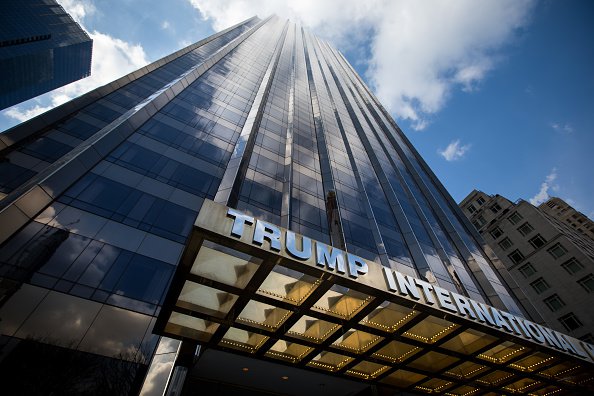
Trump International Hotel & Tower, New York, which Trump himself has described as his “flagship” hotel. © James D. Morgan/Getty Images
The board of the Trump International Hotel & Tower Condominium should have been extremely alarmed if it received a purchase application showing Claudia Sassou-Nguesso’s or her daughter’s name. As both a senior government official and a member of Congo’s Presidential family, Claudia Sassou-Nguesso should have been immediately identified as a PEP.
Although there are not any mandatory requirements for background checks to be carried out by lawyers or the real estate sector in the U.S., as a consequence of identifying a PEP, Global Witness believes enhanced checks should have been carried out on Claudia Sassou-Nguesso and her daughter and the source of funds for the apartment and maintenance fees. Given the French investigation into the Sassou-Nguesso family, this should have immediately raised concerns that Trump companies could be receiving possible stolen state funds and thereby be facilitating money laundering.
Included in the apartment purchase documents is a form signed by Veiga, as representative of yet another front company for Claudia Sassou-Nguesso, giving the Trump Corporation, which is owned by Trump, authorization to carry out background checks on the purchaser. The board supervising apartments in Trump International, on which Donald Jr sits, was also authorized to conduct these checks. It is unclear whether this due diligence was carried out, or how effective it was.
In any case, the purchase went ahead. Global Witness does not have evidence as to who owns Ecree, the company purchasing the apartment. But the apartment was paid for by a company owned by Claudia Sassou-Nguesso, and the deal done by her business partner, Veiga, representing another company she owns. It appears therefore that Claudia Sassou-Nguesso owns the Trump apartment, paid with suspected stolen state funds.
By February 2016, at a time when Trump companies were receiving monthly “common charges” (maintenance fees) payments for unit 32G, Veiga had been arrested for suspected corruption and money laundering in Congo. Despite background checks not being required by law, Global Witness believes this should have raised alarms for the Trump Organization companies and prompted a review of prior due diligence.
These facts call into question the quality of the background checks carried out by the Trump companies and the decision-making made based on them. A real estate broker or property manager should reasonably be concerned if a client, purchasing a multi-million dollar luxury property, was identified as a PEP from a notoriously corrupt government or was, in Veiga’s case, later arrested for corruption.
The question now is: did the background checks fail to raise the alarm, or did the Trump companies choose to look the other way?
TRUMP COMPANIES PROFIT FROM SEEMINGLY IGNORING RED FLAGS
As part of the purchase agreement, Ecree is obliged to pay monthly maintenance fees for unit 32G. The agreement, which names both the Trump International Management Corporation and the Trump International Hotel & Tower Condominium, provides for monthly payments of $2,832.14. It is likely that these charges will have risen since then, but taking $2,832.14 per month as a baseline, Ecree LLC should by now have paid at least $164,264.12 in maintenance fees. Trump headed these companies until he became U.S. President in January 2017.
According to Pereira’s story, Sebrit made maintenance fees payments to the Trump International Management Corporation on behalf of unit 32G: $16,000 was paid on September 10, 2014 and further $35,000 was paid on May 15, 2015. It is not known whether Sebrit continued to pay maintenance fees for 32G after May 2015. However, the apartment has not been sold since 2014, when Sebrit – Claudia Sassou-Nguesso’s company – paid for it.
Altogether, at least five Trump-owned or Trump-led companies were involved in the sale of unit 32G. Three Trump Organization companies, belonging to Trump, played key roles: as the owner of 1 Central Park West, as the broker in the sale, and as one of the companies mandated to carry out background checks on the purchaser of the apartment. Trump is still the owner of these companies, though they are currently part of the portfolio of interests held in trust by his sons. However, while his sons control the companies’ day-to-day operations through the trust he created, Trump can still receive income from them. He can revoke his sons’ authority and retake the assets in the trust at any time.
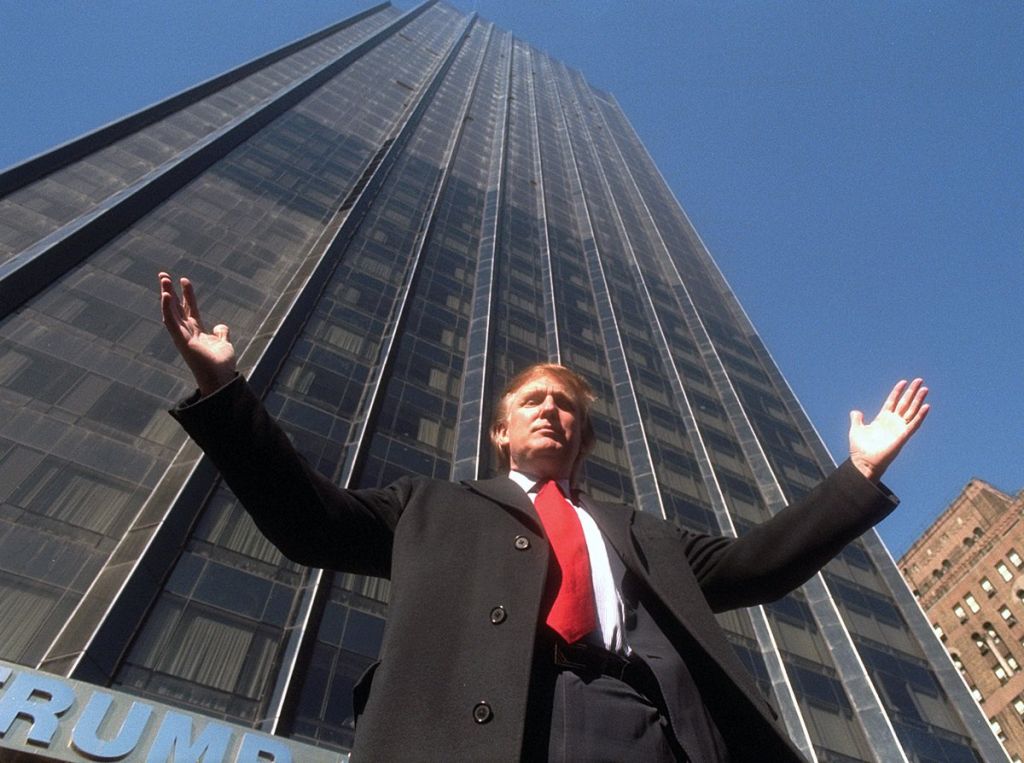
Donald Trump opening the Trump International Hotel and Tower, New York, 1997. © James Hughes/NY Daily News via Getty Images
Then there is the question of the two companies that receive maintenance fees from unit 32G. Trump’s financial disclosures indicate that he does not own these companies, so he theoretically cut ties with them when he resigned his positions before becoming U.S. President. Yet Trump’s various incomes are still murky, as Investopedia explained in October 2018: “As Trump has not released his tax returns to the public, there are many aspects of his finances which remain unclear to those outside of the Trump Organization.” Indeed, in 2018 two attorney generals subpoenaed the Trump Organization in an effort to understand whether and how Trump has profited from the presidency, partly via his real estate. Further disclosures are required to fully clarify whether or not Trump has profited from unit 32G at 1 Central Park West since he became U.S. President.
Global Witness sent written questions to the Trump Organization asking for comment on the details and allegations laid out in this article. No response to the allegations put to it for comment were received within the deadline provided. However, as this article was published, the New York Times quoted a Trump Organization spokesperson who said that unit 32G had been bought from an unrelated party and that condo fees paid for the apartment were for maintenance costs “and are not fees paid to Trump for profit.”
THE BIG PICTURE
From the use of offshore accounts and secrecy jurisdictions to enabling lawyers and anonymous companies, the purchase of apartment 32G in the Trump International demonstrates the urgent need to address the ways in which opaque companies can move funds around the world at ease, facing no tough questions on provenance or legitimacy.
Every country should require lawyers who carry out transactions for their clients and the real estate sector to know who their clients are and the source of their funds as a precaution to make sure that suspect funds are not being laundered into the property market.
Since 2001, American real estate agents have been required to establish money laundering checks, but the Treasury Department has failed to enforce this. This should change, and Treasury should immediately require companiesto disclose their ultimate owners when purchasing U.S. real estate.
Global Witness is also calling on law enforcement in the U.S., France and Portugal to investigate the signs of money laundering in the purchase of the apartment and the seeming embezzlement of public funds by the Congolese Presidential family, enabled by Veiga. If appropriate, law enforcement should hold the Trump Organization and Donald Trump accountable for their actions. Congressional committees looking into such issues should likewise investigate these allegations and hold any wrongdoers to account.
This scheme also raises serious questions that must be answered by Trump companies attached to the deal, K&L Gates, the law firm representing the seller of 32G, and the other banks and real estate agents involved. They should explain why they proceeded with these transactions despite the apparent risks of money laundering and corruption. At a minimum, now that the source of funds has been revealed, they should stop doing business with the companies linked to Claudia Sassou-Nguesso and José Veiga.
The Trump International Management Corporation and the Trump International Hotel & Tower Condominium must clarify the source of the payments for condominium maintenance of apartment 32G since May 2015 as well as Donald Trump’s role in these companies. This information is of particular public interest as there is a risk that these companies may be currently enabling money laundering of public funds embezzled by the Congolese President’s daughter and benefitting in the process.
Claudia Sassou-Nguesso and Veiga used a wide range of tools of the global financial system in order to siphon, hide and potentially launder millions of dollars that should have been spent investing in a better future for Congolese citizens.
The consequences of transactions like these can be devastating, often for people battling poverty and corrupt governments in places like Congo, where leaders give public contracts to the least scrupulous investors and the most opportunistic criminals. The U.S. and Europe have an obligation to address their own systems’ loopholes that enable corruption and money laundering, allowing notorious political elites like the Sassou-Nguessos to enjoy the luxurious spoils of apparently ill-gotten gains abroad.
Credit for banner image: © Spencer Platt/Getty Images
Mariana Abreu, Campaigner, Corruption Investigations Team
+44 (0)7912517147
Original source: